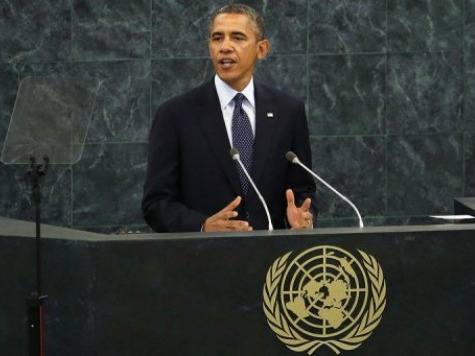
President Barack Obama struck an apologetic tone at the United Nations on Tuesday, reassuring the General Assembly that the U.S. had “shifted away from a perpetual war footing,” and describing new limits on America’s use of soldiers, drones, and intelligence. His address followed one by Brazilian President Dilma Rousseff, who criticized U.S. spying and earlier canceled a state visit over allegations she had been targeted.
The president then turned to the question of “the role of force” in international relations–a response to the UN’s failure, and his own, in dealing with Syria’s use of chemical weapons and mass murder in general. Obama introduced the issue as if it were an abstract theoretical debate–and sought to curry favor with Iran by citing “Iranians poisoned” by chemical weapons (presumably in the Iran-Iraq war of the 1980s).
Obama insisted on a UN Security Council resolution to enforce a recent Russian-brokered agreement to monitor Syria’s chemical weapons, suggesting that such a resolution could serve as a catalyst for peace in the Syrian conflict itself. Asserting that the future leadership of Syria is “for Syrians to decide,” the president said that Russia and Iran should nonetheless stop protecting Assad’s rule against “the moderate opposition.”
The assembled delegates sat impassively, having greeted President Obama with only scattered applause when he entered the room. In an attempt, perhaps, to connect with that audience, Obama rehearsed anti-American arguments, showing his fluency with what he called an “inevitable” reaction to U.S. prominence, en route to offering a defense of America’s motives and foreign policy goals, as he sees them.
Obama described three priorities: promoting economic development, stopping terror, and preventing the proliferation of weapons of mass destruction. These were “core interests,” he said, but not America’s “only interests,” stating that the U.S. believed in human rights and democracy because these also helped achieve “peace and prosperity.” Unlike his predecessor, he implied, he would not impose those values by force.
Next, Obama turned to Iran–and, in similar fashion, described the conflicting perspectives of both countries, casting himself in the role of conciliator. He insisted that the U.S. was not seeking “regime change,” and that it recognized Iran’s right to “nuclear energy,” applauding the “Supreme Leader” for a fatwa against nuclear weapons–referring deferentially to Ayatollah Ali Khamenei by his official title.
Obama insisted that newly-elected president Hassan Rouhani had “received a mandate” from the Iranian people for a “moderate” course–not commenting on the fact that the “Supreme Leader” had eliminated most other candidates from contention. He said that he supported a new round of nuclear talks between the U.S. and Iran, and presented those talks as a path to resolving the two nations’ decades-old confrontation.
Next, President Obama turned to the Israel-Palestinian conflict, again choosing to stress the perspectives of both sides. He spoke of Israel’s outrage at being denied recognition by other UN states, while also stressing the “daily indignity of occupation” felt by Palestinians. He spoke of a continued commitment to “final status” talks–and did not mention Palestinians’ attempt last year to use the UN to declare statehood.
Finally, the president turned to the Arab Spring, contending that the U.S. “has purposely avoided choosing sides” in the conflict between the Muslim Brotherhood and the Egyptian military. He pledged to continue supporting the government while withholding some military aid until Egypt made progress toward “a more democratic path,” saying that limited cooperation was a model for U.S. relations with other illiberal states.
Though delivered in his trademark lecturing style, President Obama’s address had a defensive tone. It was largely devoted to dispelling criticisms of the U.S. by the curious method of showing sympathy for those criticisms, and arguing that his own policy was different. Beyond his proposal for an unlikely resolution on Syria, Obama offered few signs of an eagerness to fill a global leadership vacuum he himself acknowledged.
He closed with a plaintive call to fellow nations to understand that there needed to be alternatives to talking when diplomacy failed, and warned–condescendingly–that those who believed otherwise should say so and be ready to reckon with the moral cost of mass graves. It was as if President Obama believed that his own scorn–not backed up by any concrete action, which he abandoned in Syria–ought to be deterrent enough.
He urged the UN to accept his personal bona fides. “No one’s more mindful of these problems than I am,” he said, referring to the Benghazi attack as an unforeseen consequence of the Libya war (without blaming a YouTube video, as he did in 2012). But in urging the UN to “leave behind the old ideological battles of the past,” Obama showed himself to be mired in an outdated belief in his own powers of rhetorical persuasion.

COMMENTS
Please let us know if you're having issues with commenting.